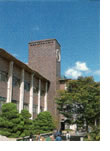
Ritsumeikan University Faculty of Law

Established in 1900 originally as an evening lawschool for working adults, the College has a long- standing as well as time-honored history, as evidenced in its notble alumni of legal scholars, lawyers and distinguished public servants in national and local governments. As a demonstration of the Colleges commitment to law and society,Ritsumeikan restored the 15th courtroom of the Kyoto District Court, which is now housed in the Suekawa Memorial Hall on the Kinugasa campus. Trials by jury were held in this courtroom under the Jury Act for approximately fifteen years from 1928 to 1943.
As society becomes more and more internationalized, information-oriented and diversified, a wider and deeper understanding of law has become vital in every aspect of human life. To accommodate ongoing social changes, the College now has 4 areas of concentration: 1) general practice of law, 2) law related to environment and civil life, 3) international and comparative law, and 4) politics and public administration.
Study begins with each freshman attending a proseminar in a cLaw of approximately 35 students to learn techniques for legal and political studies, and fundamental knowledge of social science through discussions. In the third year, students then select one specialized seminar and continue to pursue advanced legal and political studies for the next two years.
Intensive courses for the national bar examination and national or local civil service examinations are also available in cooperation with Ritsumeikan's Extension Center.

Contents

|

